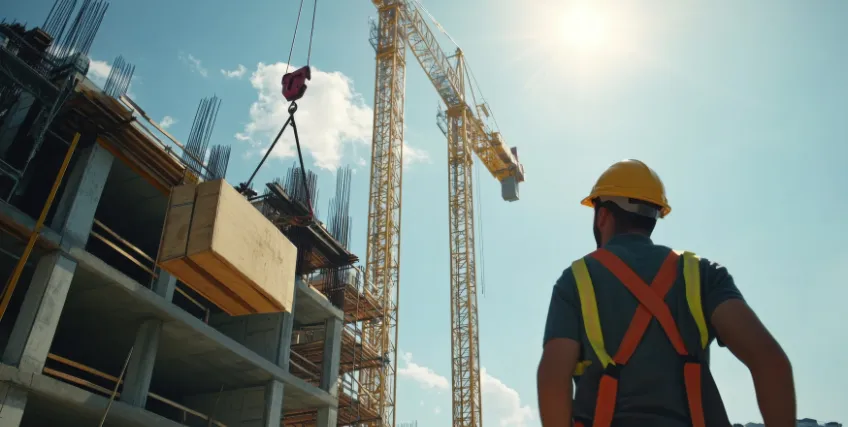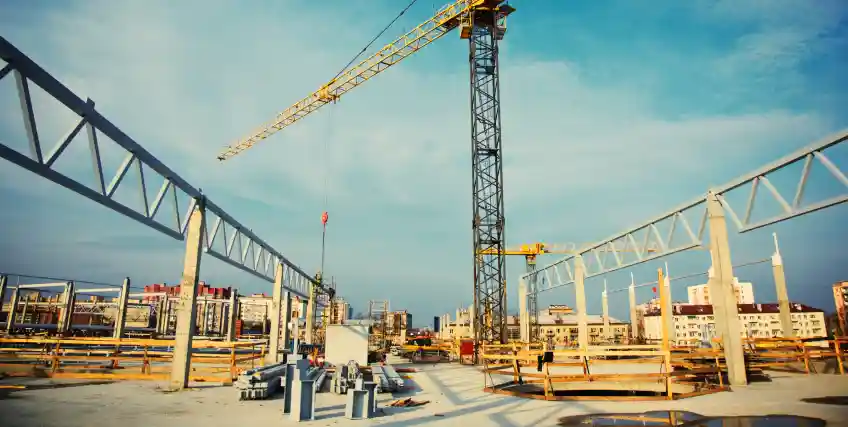Get Access to Crane Financing
That Are Built for Heavy Lifts
Looking for Business Financing?
Apply now for flexible business financing. Biz2Credit offers term loans, revenue-based financing, and commercial real estate loans to qualified businesses.
Set up a Biz2Credit account and apply for business financing
Crane service businesses in the U.S. operate in high-stakes environments. Heavy equipment, skilled labor, and job site risks make it a serious cash-burning machine. Whether you're lifting steel for high-rises or hauling HVAC systems with truck cranes, there's no room for financial slip-ups.
Now toss in rising fuel costs, regulatory changes, and the steep price of crane equipment. You’ll see why crane financing is more than helpful. In fact, it’s necessary. Even used cranes can run deep into six figures. So, getting access to financial solutions like equipment financing or a line of credit often keeps your business from stalling.
Plus, most jobs don’t pay upfront. Which means your cash flow might dry up before you finish a contract. That’s where crane financing comes into play. It fills those short-term gaps without forcing you to sacrifice other essentials like payroll or safety certifications.
Let’s face it. The right financing options can open doors like buying new units, boosting lifting capacity, or simply surviving a long payment cycle. It’s not just about growth. It’s about survival.
Key Business Costs for Crane Service Companies
Running a crane business isn't cheap. From keeping machines safe to hiring licensed pros, every piece of the puzzle demands money. Crane financing helps cover these recurring costs without killing your cash flow.
1. Equipment Repairs and Inspections
Cranes take a beating on job sites. Regular maintenance like wire rope replacements, hydraulic system checks, or boom inspections can rack up thousands fast. OSHA also mandates frequent safety checks. That’s where crane financing or a line of credit can really step in to cover repair gaps and avoid downtime. You don’t want your crawler or mobile cranes idling while clients wait.
2. Insurance and Liability Coverage
Heavy equipment means heavy risks. Commercial auto, liability, and worker’s comp are must-haves. These premiums aren’t small, and they show up even during slow months. Using crane financing to manage these fixed costs helps you stay compliant while protecting your operators and your books. One major claim without insurance? Could wipe out months of revenue.
3. Labor and Operator Training
Certified crane operators don’t come cheap. Between union wages and licensing courses, labor eats into your budget. And if you’re bringing in new guys, there’s training and certifications to handle. Many borrowers use working capital loans or equipment financing to handle these upfront labor costs.
4. Fuel and Transportation Expenses
Fuel alone can throw off your monthly budget. Especially with all-terrain cranes or large-scale hauls. Toss in permits, tolls, and truck maintenance, and it adds up. Some use crane financing or short-term options to manage these travel-related costs without affecting ongoing operations.
Where Crane Financing Makes the Biggest Impact
If you're eyeing growth or just trying to stay afloat, crane financing often becomes a game-changer. It’s not just about buying gear. It’s about solving real problems tied to scale, timing, and survival.
Purchasing New or Used Cranes
Crane models don’t come cheap. A brand-new crawler crane or all-terrain crane can eat up your entire year’s revenue. Even a decent used crane runs six figures. That’s why many owners lean on equipment financing to lock in competitive rates while preserving working capital. It lets them invest without draining their checking account.
Expanding Fleets for Larger Contracts
Bidding for multiple job sites? You’ll need more than one unit. But expanding too fast can crush your cash flow. Here’s where crane financing helps you scale smart. With flexible terms, you can take on new projects without waiting for your current jobs to pay out.
Covering Lease Buyouts or Down Payments
Some businesses use crane loans to buy out long-term leases or handle a steep down payment on a newer machine. This frees you from ongoing lease fees and shifts you into ownership mode faster. It’s a smart play if your credit score qualifies you for decent interest rates.
Funding Short-Term Working Capital Needs
Delays in payment can dry up your reserves. A short-term infusion through crane financing gives breathing room to pay operators, buy fuel, or repair older equipment. It keeps your crews moving and projects on track.
Common Crane Financing Options in the US
Not all crane financing solutions are built the same. Depending on your business needs, loan type, or credit situation, some options work better than others. Here’s what crane companies commonly go for.
Term Loans
A term loan is one of the most straightforward ways to access capital. You borrow a lump sum and repay it over a set period with interest. Companies use it for buying cranes outright or making big upgrades. If you’ve got a solid credit score and steady revenue, this might offer competitive rates and larger loan amounts to meet your scale goals.
Equipment Financing
Probably the most popular choice for crane operators. The loan is backed by the crane equipment itself, so lenders are more open to approving even bad credit borrowers. It’s ideal when buying a new or used crane without draining your savings or working capital.
Business Line of Credit
Need funds fast and don’t want a large lump sum? A line of credit offers access to funds when needed, and you only pay interest on what you use. It’s flexible and works well for ongoing jobs or surprise repairs. Many crane companies love the flexibility this gives them.
Lease-to-Own Options
If purchasing isn’t realistic upfront, this gives you a way to get cranes into your fleet. Payments are spread over time and may lead to ownership. This financing option is often easier to get approved for with basic financials and a working phone number or checking account.
Pros and Cons of Crane Financing
Crane financing can unlock a ton of possibilities. But it's not a magic fix. Like anything, it has ups and downs. Let’s break it down so you're not flying blind.
Pros of Crane Financing
1. Protects Cash Flow
Instead of wiping out your reserves to buy equipment, crane financing lets you keep your cash flow intact. You still get the crane, but without emptying the bank. That means you can handle emergencies, payroll, or last-minute supplies without skipping a beat.
2. Builds Business Credit
Paying your monthly payment on time helps boost your credit score. Over time, this opens more doors to financial solutions, including better loan terms or faster pre-approved offers from lenders.
3. Get What You Need Fast
When you spot a deal on a used crane or a new contract pops up, having access to crane financing lets you act quickly. Speed matters in this business.
Cons of Crane Financing
1. High Interest with Poor Credit
Let’s be real. If your credit score isn’t great, your interest rates probably won’t be either. Some borrowers with bad credit may pay more in the long run.
2. Payments Can Be Stressful
Even with flexible terms, that monthly payment shows up whether you're booked or not. If business slows down, it could squeeze your working capital.
Mistakes to Avoid When Applying for Crane Loans
Applying for crane financing can be a great move. But if you skip the homework, it could cost you literally. Here are common mistakes crane service companies should steer clear of.
1. Ignoring the Total Loan Cost
That shiny low monthly payment might look good, but what's the real cost across 5 or 7 years? Many borrowers forget to factor in interest rates, fees, or penalties for early payoff. When comparing financing options, always check the full repayment amount on the finance agreement, not just what’s due this month.
2. Not Preparing Financial Documents
Want fast approval? Then don’t show up empty-handed. Lenders usually want tax returns, bank statements, proof of revenue, and info on the type of crane you plan to buy. If your loan application is missing key stuff, it slows the process or gets rejected.
3. Choosing the Wrong Financing Option
Some go for a personal loan or generic business loan without checking if equipment financing or a line of credit would be smarter. The wrong move here can lead to higher costs or tighter loan terms. It’s worth checking which financing solution really fits your needs.
4. Skipping the Fine Print
It’s boring, but it matters. Read the loan terms, especially stuff on default, fees, or lien on your crane equipment. One clause can change everything.
Success Stories from Our Clients*
Articles on Crane Financing
Crane Truck Financing: Popular Loan and Leasing Options for Contractors
Imagine landing a big construction project but lacking the right crane equipment. How to deal with this situation? Buying new crane...
Popular Crane Equipment Financing Solutions for Small and Mid‑Sized Contractors
Crane equipment is essential for small and mid-sized contractors in the U.S. who are aiming to expand and meet the increasing...
Popular Crane Loan Options for Small Construction Businesses
For small construction businesses, acquiring a crane can be transformative, boosting capacity, project scope, and long-term competitiveness. However...
Frequently Asked Questions on Crane Financing
1. Can I get crane loans if my business is fairly new?
It might be tougher to get crane financing if you are just starting out. New businesses may need a larger down payment, solid financial projections, or personal guarantees. Startups can still access equipment financing if they show consistent contracts or industry experience.
2. Are there short-term crane financing options?
Some companies use short-term crane financing for fast needs like working capital, fuel costs, or emergency repairs. These usually come with quicker approvals but higher interest rates.
3. Can I finance both new and used cranes?
Many lenders offer crane loans for both. Just keep in mind that used crane financing may have different terms based on age, condition, and functionality.
4. Is a line of credit better than a term loan for crane businesses?
It depends. A line of credit is great for ongoing jobs or surprise expenses. But if you're buying a crane outright, term loans or equipment financing often make more sense for predictable payments.
5. Can I get crane financing if I have bad credit?
You might but it'll be harder. Some lenders still consider bad credit borrowers, especially if the crane itself serves as collateral. Expect higher interest rates and stricter loan terms.
Frequent searches leading to this page
Term Loans are made by Itria Ventures LLC or Cross River Bank, Member FDIC. This is not a deposit product. California residents: Itria Ventures LLC is licensed by the Department of Financial Protection and Innovation. Loans are made or arranged pursuant to California Financing Law License # 60DBO-35839



